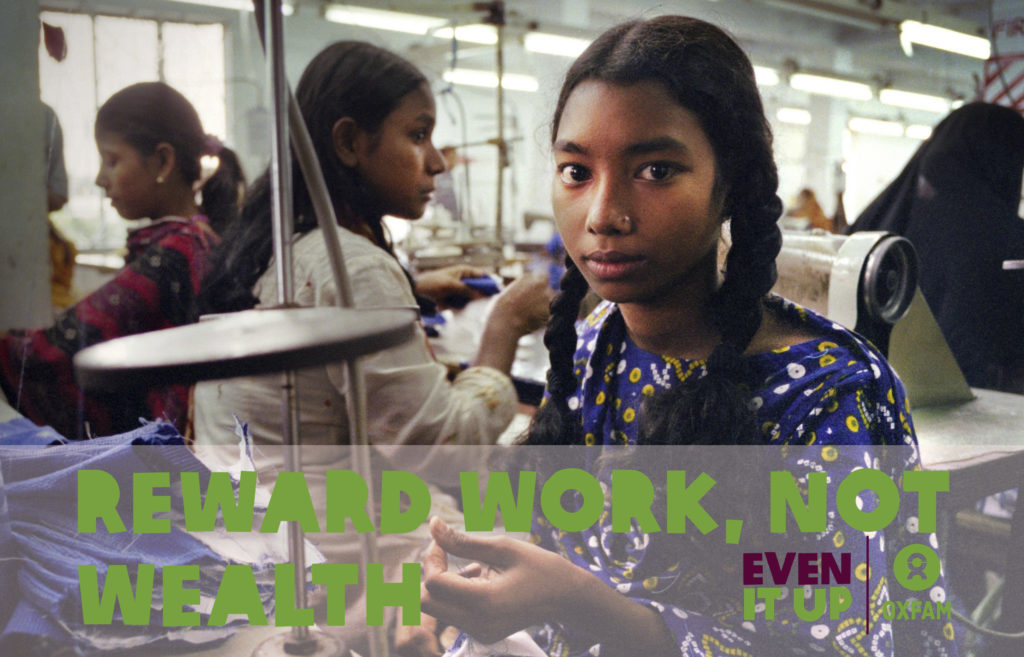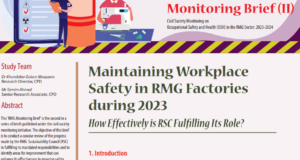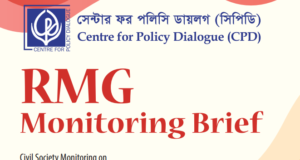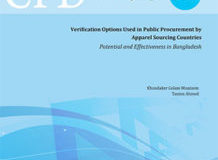Published in Dhaka Tribune on January 22, 2018

The report released on Monday has been launched as political and business elites gather for the World Economic Forum in Davos, Switzerland
A CEO from one of the world’s top five global fashion brands has to work for just four days to earn what a garment worker in Bangladesh earns in his entire life, non-profit organization Oxfam International revealed in a report on Monday.
The findings were revealed during the release of a report titled “Reward Work, Not Wealth” at a gathering of political and business elites for the World Economic Forum in Davos, Switzerland, reports Associated Press.
In its report, Oxfam said the richest 1% bagged 82% of the wealth generated last year while the 3.7 billion people who make up the poorest half got nothing.
The report reveals how the global economy enables the super-rich to accumulate vast wealth at the expense of hundreds of millions of people who are struggling to survive on poverty pay.
“The billionaire boom is not a sign of a thriving economy but a symptom of a failing economic system,” Winnie Byanyima, executive director of Oxfam International, said.
“The people who make our clothes, assemble our phones, and grow our food are being exploited to ensure a steady supply of cheap goods, and swell the profits of corporations and billionaire investors.”
Women workers often find themselves at the bottom of the heap, consistently earning less than men and concentrated in the lowest paid and least secure forms of work. By comparison, nine out of 10 billionaires are men.
“Oxfam has spoken to women across the globe whose lives are blighted by inequality,” Byanyima said. “Women in Vietnamese garment factories who work far from home for poverty pay and do not get to see their children for months at a time.
“Women working in the US poultry industry who are forced to wear nappies because they are denied toilet breaks. Women working in hotels in Canada and the Dominican Republic who stay silent about sexual harassment for fear of losing their jobs.”
Oxfam is calling on governments to ensure world economies work for everyone and not just the fortunate few.
The organization wants limitations placed on returns to shareholders and top executives, and a minimum ‘”living”’ wage that would enable all workers to have a decent quality of life.
It wants to eliminate the gender pay gap and protect the rights of women workers; at current rates of change it will take 217 years to close the gap in pay and employment opportunities between women and men.
Furthermore, Oxfam is urging the wealthy to pay their fair share of tax through higher taxes and a crackdown on tax avoidance, and an increase spending on public services such as healthcare and education. Oxfam estimates a global tax of 1.5% on billionaires’ wealth could pay for every child to go to school.
The new global survey commissioned by Oxfam demonstrates a groundswell of support for action on inequality.
Of the 120,000 people surveyed in 10 countries, nearly two-thirds of all respondents think the gap between the rich and the poor needs to be urgently addressed. Respondents also said that CEO pay should be cut by an average of 40% and the pay of unskilled workers increased by an average of 60%.
“It’s hard to find a political or business leader who doesn’t say they are worried about inequality,” said Byanyima.
“It’s even harder to find one who is doing something about it. Many are actively making things worse by slashing taxes and scrapping labor rights.”
Byanyima said people across the globe are ready for change.
“They want to see workers paid a living wage; they want corporations and the super rich to pay more tax; they want women workers to enjoy the same rights as men; they want a limit on the power and the wealth which sits in the hands of so few. They want action.”
Oxfam’s calculations are based on global wealth distribution data provided by the Credit Suisse Global Wealth Data book 2017. The wealth of billionaires was calculated using the most recent Forbes’ billionaires list published in March 2017.
RIWI and YouGov conducted the online survey for Oxfam in 10 countries: India, Nigeria, United States, United Kingdom, Mexico, South Africa, Spain, Morocco, Netherlands and Denmark.
 CPD RMG Study Stitching a better future for Bangladesh
CPD RMG Study Stitching a better future for Bangladesh



